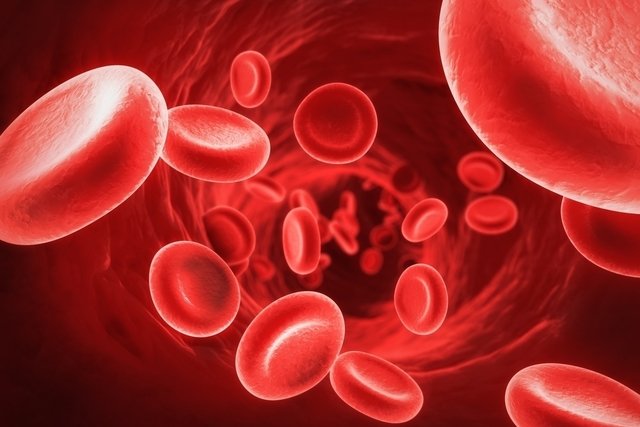Megaloblastic anemia is a type of anemia in which the bone marrow produces larger than normal red blood cells and a decrease in the size of white blood cells and platelets, occurring mainly due to a deficiency of vitamin B12 or B9 in the blood.
This type of anemia can cause symptoms such as excessive tiredness, paleness, weakness and difficulty breathing in some cases, however symptoms can vary from one person to another.
It is important that megaloblastic anemia is identified and treated according to the guidance of the general practitioner or hematologist, who may indicate changing eating habits or taking vitamin B12 or B9 supplementation, depending on the cause of the anemia.

Symptoms of megaloblastic anemia
The main symptoms of megaloblastic anemia are:
- Excessive tiredness;
- Pallor;
- Weakness;
- Muscle pain;
- Difficulty breathing;
- Loss of hair;
- Loss of appetite with weight loss;
- Changes in intestinal transit, with diarrhea or constipation;
- Abdominal pain or nausea;
- Tingling in the hands or feet;
- Pallor;
Furthermore, in cases where megaloblastic anemia is caused by a deficiency of vitamin B12, it is possible that some neurological symptoms may appear, such as tingling in the hands or feet, loss of sensitivity or muscle weakness. Over time, other symptoms may be noticed, such as problems with balance or walking, loss of vision, mental confusion or memory loss.
Main causes
Megaloblastic anemia is mainly related to a decrease in vitamin B12 or B9 levels:
1. B12 deficiency
Vitamin B12 deficiency occurs due to reduced intake of foods rich in this vitamin, being more common in vegetarian and vegan people, as sources of vitamin B12 are of animal origin.
Furthermore, the lack of intrinsic factor, which is a protein that binds to vitamin B12 in the stomach so that it can be absorbed in the intestine, can also cause a type of megaloblastic anemia, called pernicious anemia. Learn more about pernicious anemia.
Other situations such as pancreatic insufficiency, intestinal resection or the use of some medications can also cause vitamin B12 deficiency and, consequently, megaloblastic anemia.
2. Folic acid deficiency
Folic acid (vitamin B9) deficiency can occur due to excessive alcohol consumption, which affects its intestinal absorption, and reduced consumption of foods rich in this micronutrient.
Other possible causes are increased demand for this vitamin, as occurs during pregnancy and hemodialysis, malabsorption due to Crohn’s disease or intestinal surgery, or the use of anticonvulsant or carcinogenic medications that interfere with folic acid metabolism.
3. Use of some medications
The use of some medications can cause changes in the bone marrow, affecting the formation of red blood cells, such as allopurinol, methotrexate, fluoracil, azathioprine, among others.
How the diagnosis is made
The diagnosis of megaloblastic anemia is made by a general practitioner or hematologist, initially, by evaluating the signs and symptoms presented by the person. To confirm the diagnosis, the doctor must recommend a blood count and measurement of vitamin B12 and B9 in the blood.
It is important that the type of anemia is identified so that the most appropriate treatment can be recommended.
How should the treatment be
The treatment of megaloblastic anemia must be carried out according to the doctor’s instructions and the cause of the anemia. Therefore, in the case of pernicious anemia, the doctor may recommend injecting vitamin B12 daily or supplementing this vitamin orally, until the levels of this vitamin in the body are balanced and the hemoglobin levels in the blood are normalized.
In the case of megaloblastic anemia due to B12 deficiency, treatment usually consists of improving eating habits, in which the person should give preference to foods that are sources of this vitamin, such as fish, cheese, milk and brewer’s yeast, for example. In addition, the nutritionist or doctor may also recommend supplementation with this vitamin.
When megaloblastic anemia occurs due to vitamin B9 deficiency, the doctor may recommend oral B9 supplementation or the intake of foods rich in folic acid, such as spinach, broccoli, nuts and beans, for example.
Bibliography
- CLEVELAND CLINIC. Megaloblastic Anemia. Disponível em: <https://my.clevelandclinic.org/health/diseases/23160-megaloblastic-anemia#diagnosis-and-tests>. Acesso em 20 dez 2022
- NIH. Megaloblastic Anemia. Available at: <https://www.ncbi.nlm.nih.gov/books/NBK537254/>. Accessed on 20 Dec 2022
- SÁ, Lilian S. M. Megaloblastic anemia and its pathophysiological effects. Rev. Eletrôn. Update Health. Vol 5. 5 ed; 55-61, 2017

Sign up for our newsletter and stay up to date with exclusive news
that can transform your routine!
Warning: Undefined array key "title" in /home/storelat/public_html/wp-content/plugins/link-whisper-premium/templates/frontend/related-posts.php on line 12
Warning: Undefined array key "title_tag" in /home/storelat/public_html/wp-content/plugins/link-whisper-premium/templates/frontend/related-posts.php on line 13



